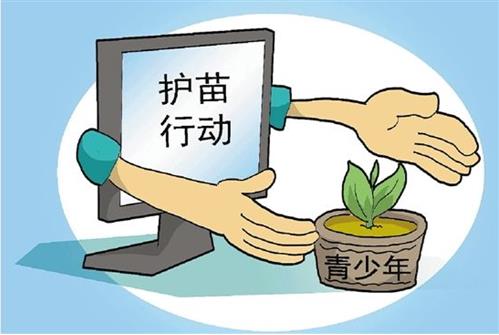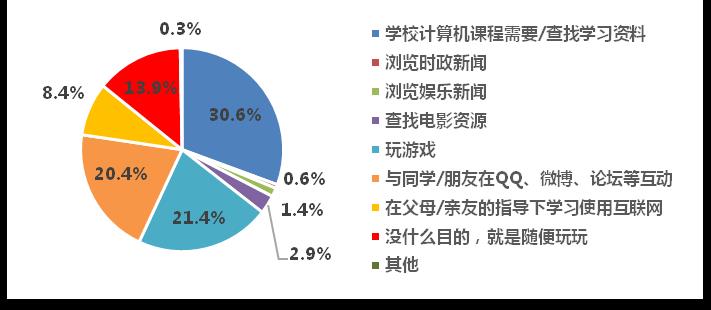Strengthening the network security education of "indigenous people" and "protecting seedlings" also made the network clear.
On the occasion of the International Children’s Day on June 1st, in order to create a network environment conducive to the healthy growth of teenagers and raise their awareness of network security, the National Internet Information Office launched the "Nursery 2015 Online Action" nationwide to comprehensively clean up information harmful to children’s physical and mental health, such as obscenity, violence, terror, cruelty and superstition. The activity lasted from May 20th to June 7th.
Since the launch of the activity, the relevant departments have made unremitting efforts to improve the network information, and the contents of most websites have gradually become healthy and orderly. However, for young people who are not familiar with the world, bad information has done great harm to their physical and mental health development. In recent years, the crime rate of cyber crimes among minors has increased significantly, and cyber security education for young people has become an unavoidable topic.

Action to protect seedlings. source map
Minors have become a new force in network use.
The Seventh Survey Report on Internet Usage of Minors in China (2013) jointly released by China Young Pioneers Career Development Center and other institutions in June 2014 shows that the Internet penetration rate of urban minors exceeds 92%, while that of rural minors exceeds 80%. Minors, as a unique group of netizens, have become a new force in network use.
Children born after 1995 grew up in the internet immersion and were vividly called "Internet aborigines". Contemporary minors have grown up with the development of the Internet. The Internet has increasingly become an important way for minors to learn, live, entertain, understand and participate in society. It is a basic tool for minors to grow up and is changing their lifestyle, thinking mode, behavior mode and mobilization mode.
A survey on the network protection of minors in China, commissioned by the Network Social Work Bureau of the National Internet Information Office and conducted by the China Society for the Prevention of Juvenile Delinquency, shows that the age when minors first touch the Internet is getting lower and lower, and the number of Internet users under 6 years old accounts for 3.3%. The reasons for these children surfing the Internet are basically to find study materials and play games. More than 70% of middle school students in China surf the Internet at least once a week, and nearly 20% of them spend more than 3 hours surfing the Internet each time.

Statistics on the reasons of minors surfing the Internet for the first time. Image source: China Youth Crime Prevention Research Association
Therefore, it is self-evident that it is necessary to carry out the "seedling protection action". Clear cyberspace not only means a healthy growth environment, but also relates to the future of the country. Ren Xianliang, deputy director of the National Internet Information Office, said, "The online work of’ eliminating pornography and illegal publications’ is related to the healthy growth of young people. The’ Nursery Action’ is to protect children’s physical and mental health and make the Internet their confidants, friends and teachers, rather than gangsters and demons who infringe on them. "
Youth network security education needs to be strengthened urgently.
Today, the launching ceremony of the 2nd National Cyber Security Publicity Week was held in science and technology hall, China. At the same time, the National Cyber Security Youth Popular Science Base was unveiled, and the Survey Report on Public Cyber Security Awareness was released for the first time. Cyber security publicity week is the third stage of the "seedling protection action".
When it comes to cyber security, a survey conducted by the China Youth Crime Prevention Research Association points out that some countries pursue information hegemonism in their foreign policies and use advanced Internet media technology for reactionary infiltration and inflammatory political propaganda. According to the survey, "the Internet has become a’ heavy weapon’ used by various hostile forces to engage in reactionary activities, and a large number of information that endangers public safety and social stability and subverts traditional moral values has been widely disseminated through the Internet."
Chen Guangzhong, a tenured professor at China University of Political Science and Law and honorary president of the Institute of Litigation Law, also said at the national seminar on juvenile justice and comprehensive protection that the Internet is a big problem, and many "baby soldiers" in the Islamic State have been bewitched by online information. The protection of minors is a problem of the country and the world, a problem of social governance, and also reflects the level of modernization of the country’s governance capacity. Therefore, the whole society should carry out sustained and in-depth research on juvenile network management.
A survey on minors’ reaction to cyber violence shows that 54.9% are "quit the webpage and don’t tell anyone", 31.7% are "continue to browse other information and deal with it later", 21.5% are "tell classmates and teachers" and only 7.4% are "report to the police". In this context, it is particularly important to strengthen the network literacy education of minors and actively guide them to correctly understand and effectively use the network. However, China’s network literacy education for minors is still in its infancy, and the network literacy education is mainly confined to the classrooms of communication colleges in colleges and universities. According to a survey conducted by the China Youth Crime Prevention Research Association, "In the primary and secondary education system, network literacy is still a new term for many front-line educators. There is a lack of understanding of the status quo of local minors’ network literacy, and there is also a lack of activities and training courses suitable for local minors’ network literacy education. It has not risen to the strategic agenda of government departments, nor has it been included in the school’s education curriculum system, and there is a lack of professional education teachers. "
So how should teenagers use the internet reasonably? Niu Kai, deputy secretary-general of China Youth Crime Prevention Research Association, said in an interview with China Youth Network: First, understand the basic network knowledge and how to use online media; The second is to learn to judge the significance and value of network information; The third is to learn the knowledge and skills of creating and disseminating network information; The fourth is to understand how to use the network to develop yourself and know the society.
Juvenile cyber crime calls for clear network.
According to the statistics of China Youth Crime Prevention Research Association, 70% of the total juvenile crimes are caused by internet pornography and violent content, which leads to several serious crimes such as theft, robbery and rape, forming a "juvenile cyber crime phenomenon". Juvenile cyber crime and its social assistance have become a serious social problem.
In the interview, Zhang Hanyu, director of the the Supreme People’s Procuratorate Juvenile Criminal Prosecution Office, told the reporter of China Youth Network that "there are many cases of learning criminal skills from online games and committing crimes through online groups. For example, in a case, children made friends online to form a’ rose gang’, calling on’ whoever is bullied, everyone has the responsibility to help him’ and organizing activities similar to’ big series’."
Song Yinghui, vice president of the Institute of Criminal Law Science of Beijing Normal University, also mentioned in an interview with China Youth Network that "although the state has various regulations on network information, they have not been put in place, and basically the relevant departments have not attached great importance to it conceptually. Who’s in charge if something goes wrong? Who will be responsible? "
Regarding how to put an end to cyber crimes committed by minors, Song Yinghui called for, first of all, improving legislation and increasing the punishment for making and disseminating bad online information. Secondly, family and society should be governed together in many ways, parents should correctly guide their children to participate in online activities, and at the same time establish a linkage mechanism between family protection and school protection. Zhang Hanyu believes that, first, it is necessary to "ban watching", such as learning from foreign films and website login grading systems, and using technical means to provide special protection for young people. Second, it is necessary to "supervise", and the supervision departments should strengthen linkage, conduct special investigations on network security from time to time, and expand the scope of illegal activities.
On this road to a bright and healthy future, only when families, schools and society are linked together, and legislation, supervision and guidance are coordinated, can the information-based expressway be fresh, bright and unimpeded, and the smiling faces of children on Children’s Day on June 1st be mapped to a clean and tidy future abroad. (Reporter is surrounded by Yang Yue)